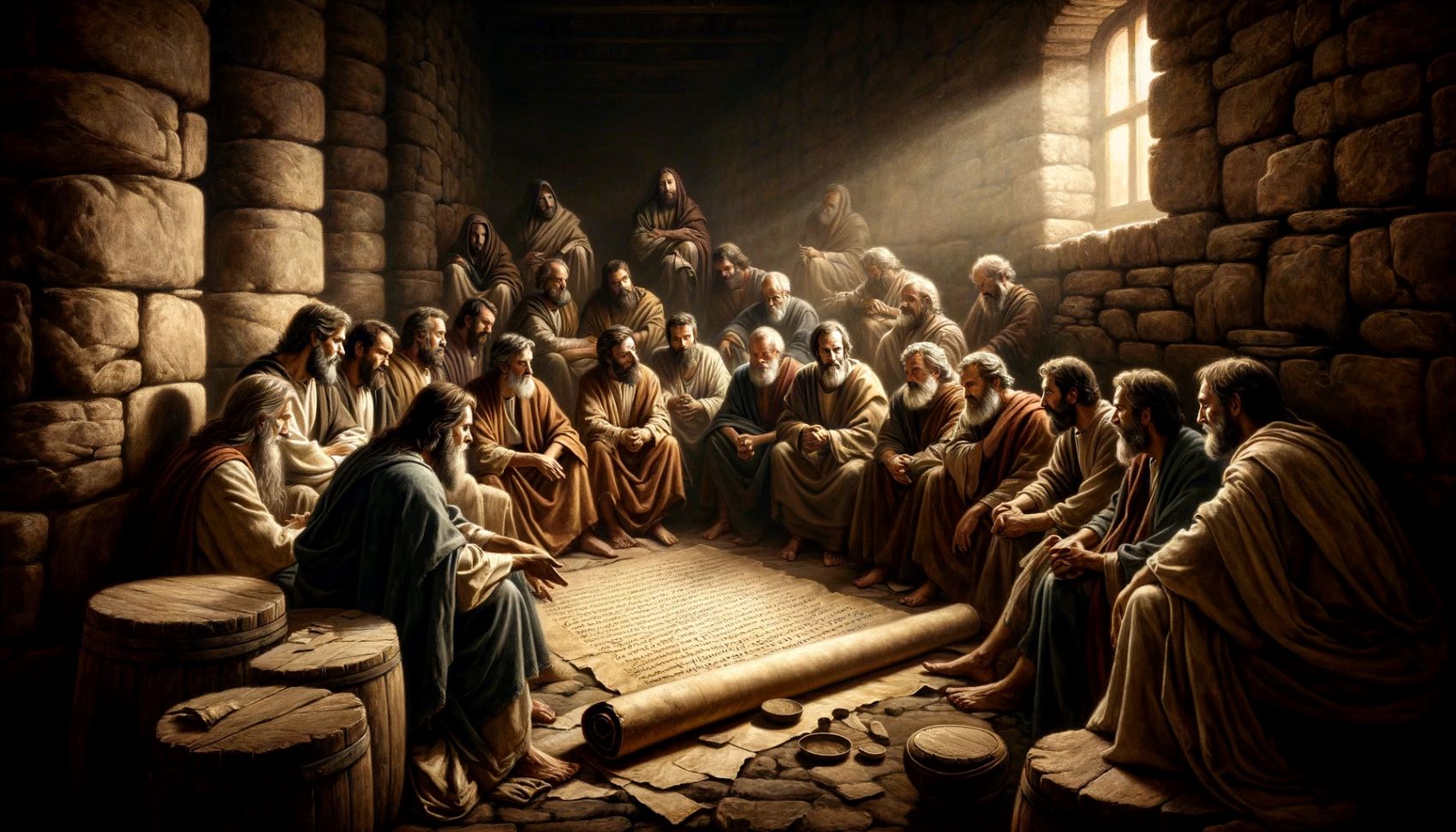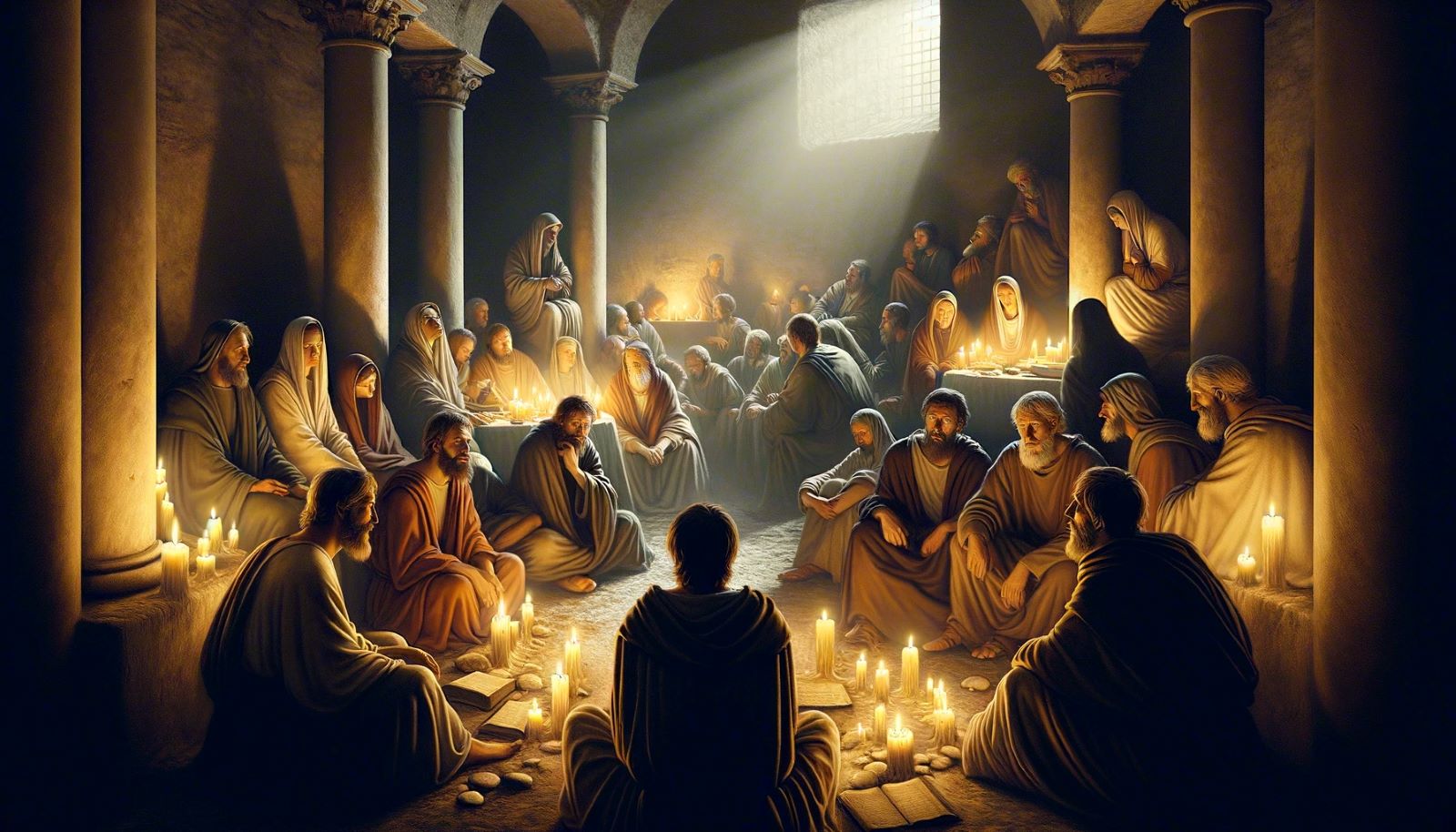Home>Bible Facts>What Does The Communion Of Saints Mean In The Apostles Creed


Bible Facts
What Does The Communion Of Saints Mean In The Apostles Creed
Published: February 18, 2024
Jason DeRose, Managing Editor at Christian.net, uses his expertise in religion and journalism to deepen understanding of faith's societal impacts. His editorial leadership, coupled with a strong academic background, enriches the platform’s diverse content, earning him recognition in both journalism and religious circles.
Discover the significance of the Communion of Saints in the Apostles Creed and explore its biblical facts. Uncover the deeper meaning of this essential Christian belief.
(Many of the links in this article redirect to a specific reviewed product. Your purchase of these products through affiliate links helps to generate commission for Christian.net, at no extra cost. Learn more)
Table of Contents
Introduction
The Apostles' Creed stands as one of the oldest and most cherished statements of faith in Christianity. Its origins can be traced back to the early centuries of the Church, and it continues to hold profound significance for believers around the world. Within this creed, the phrase "communion of saints" holds a special place, evoking a sense of unity, fellowship, and spiritual interconnectedness among Christians. This article aims to delve into the rich tapestry of meaning encapsulated within the "communion of saints" and its profound implications for Christian faith and practice.
The "communion of saints" is not merely a theological concept but a living reality that resonates deeply within the hearts of believers. It speaks to the interconnectedness of the body of Christ across time and space, transcending individual denominations and cultural boundaries. As we explore the historical background, biblical foundation, and practical implications of this phrase, we will uncover the depth of its significance in shaping the identity and mission of the Church.
The journey into the heart of the "communion of saints" invites us to reflect on the timeless truths that bind Christians together as one family, united in their devotion to Christ. It is a journey that traverses the annals of history, drawing from the wisdom of the early Church fathers and the enduring legacy of Christian tradition. Moreover, it beckons us to contemplate the scriptural underpinnings of this profound communion, revealing the interconnectedness of believers across generations and the spiritual bond that transcends earthly limitations.
As we embark on this exploration, we will unravel the multifaceted layers of meaning embedded within the "communion of saints," shedding light on its relevance in contemporary Christian life and worship. This journey will illuminate the ways in which this ancient creedal phrase continues to inspire and guide believers in their pursuit of faith, unity, and service to the world.
Join us as we embark on a captivating odyssey through the corridors of Christian history and theology, seeking to grasp the profound significance of the "communion of saints" in the Apostles' Creed.
Historical Background of the Apostles Creed
The Apostles' Creed, a foundational statement of Christian faith, has its roots deeply embedded in the early traditions of the Church. While its exact origins are shrouded in the mists of antiquity, the creed is believed to have emerged in the 2nd century as a succinct summary of the apostolic teachings. Its name, "The Apostles' Creed," reflects the association with the twelve apostles, symbolizing the continuity of faith from the era of Christ's disciples to the burgeoning Christian community.
The creed's formulation was influenced by the need to articulate essential Christian doctrines and beliefs, particularly in response to various heresies that challenged the orthodox understanding of the faith. As the early Church grappled with theological controversies, the Apostles' Creed served as a unifying declaration of core Christian tenets, providing a doctrinal anchor amidst doctrinal disputes and theological diversity.
Over the centuries, the Apostles' Creed underwent gradual development, with different regions and Christian communities contributing to its textual evolution. While the creed's precise authorship remains uncertain, its enduring significance lies in its ability to encapsulate the foundational truths of Christianity in a concise and accessible manner.
The creed's widespread adoption within the liturgical life of the Church further solidified its status as a unifying symbol of Christian identity. It became an integral component of baptismal rites, catechetical instruction, and corporate worship, serving as a unifying confession of faith for believers across diverse cultural and linguistic contexts.
The historical background of the Apostles' Creed reflects the enduring legacy of early Christian witness and the ongoing quest to articulate the essentials of Christian faith in a changing world. Its resilience and adaptability across centuries testify to its enduring relevance as a touchstone of Christian orthodoxy and a testament to the enduring faith of the apostolic community.
In summary, the historical background of the Apostles' Creed underscores its pivotal role in shaping Christian identity, fostering doctrinal unity, and preserving the timeless truths of the Christian faith. Its journey through the annals of history stands as a testament to the enduring power of creedal statements in anchoring the Church in the unchanging truths of the gospel.
The Meaning of "Communion of Saints"
The phrase "communion of saints" encapsulates a profound theological concept that lies at the heart of Christian belief and practice. At its core, the term "communion" denotes a deep sense of fellowship, sharing, and interconnectedness. In the context of the Christian faith, it signifies the spiritual unity and solidarity among all believers, transcending temporal and spatial boundaries. The word "saints" refers not only to those officially recognized as saints by the Church but encompasses the entire body of Christ, comprising all who have professed faith in Jesus Christ.
The communion of saints embodies the idea of a spiritual bond that unites believers across generations, cultures, and denominations. It emphasizes the shared inheritance of faith, the mutual participation in the life of Christ, and the collective identity as members of God's redeemed community. This communion extends beyond the earthly realm, encompassing the fellowship between the Church militant (believers currently living on earth), the Church expectant (believers awaiting the fulfillment of God's promises in the afterlife), and the Church triumphant (saints who have departed and now dwell in the presence of God).
Furthermore, the communion of saints underscores the interconnectedness of the body of Christ, emphasizing the mutual responsibility, care, and support that believers are called to extend to one another. It reflects the biblical imagery of the Church as a unified and diverse community, each member contributing to the edification and well-being of the whole. This communion finds expression in the sharing of spiritual gifts, prayers, and resources, as well as in the demonstration of love, compassion, and solidarity within the Christian community.
Moreover, the communion of saints encompasses the idea of collective memory and shared witness, acknowledging the enduring impact of the lives and testimonies of believers throughout history. It honors the legacy of faith exemplified by the martyrs, theologians, missionaries, and ordinary men and women who have contributed to the rich tapestry of Christian heritage. Their stories and contributions serve as sources of inspiration, encouragement, and guidance for present-day believers, fostering a sense of continuity and connectedness across the ages.
In essence, the communion of saints embodies the profound truth that Christians are not isolated individuals but interconnected members of a larger spiritual family. It speaks to the enduring bond of faith that unites believers across time and space, fostering a sense of belonging, solidarity, and shared mission within the body of Christ. This communion serves as a source of comfort, encouragement, and hope, reminding believers that they are part of a larger narrative of God's redemptive work in the world.
The Biblical Basis for the Communion of Saints
The biblical foundation for the communion of saints finds its roots in the rich tapestry of scriptural teachings that underscore the interconnectedness and unity of the body of Christ. The concept of spiritual communion among believers is intricately woven throughout the pages of the New Testament, reflecting the divine design for the Church as a unified and interdependent community.
One of the foundational passages that undergirds the communion of saints is found in the writings of the apostle Paul. In his first letter to the Corinthians, Paul employs the metaphor of the body to illustrate the interconnected nature of the Church. He emphasizes that, just as the human body is composed of diverse yet interdependent parts, so too is the body of Christ constituted by individual believers who are united in their shared faith and purpose. This imagery highlights the organic unity and mutual dependence that characterize the communion of saints, emphasizing the essential role that each member plays in the functioning and flourishing of the whole (1 Corinthians 12:12-27).
Furthermore, the biblical narrative portrays the early Christian community as a fellowship characterized by shared devotion, mutual support, and collective worship. The book of Acts provides a vivid depiction of believers coming together in prayer, breaking bread, and sharing their resources in a spirit of unity and generosity (Acts 2:42-47). This communal ethos reflects the essence of the communion of saints, emphasizing the shared life, faith, and mission that bind believers together as one body.
Moreover, the biblical concept of the communion of saints extends beyond the earthly realm to encompass the spiritual bond between believers across the ages. The author of the letter to the Hebrews draws attention to the enduring witness of the faithful saints who have gone before, affirming their continued participation in the overarching narrative of God's redemptive plan. This spiritual continuity underscores the interconnectedness of the entire body of Christ, transcending temporal limitations and affirming the ongoing communion between believers on earth and those who have entered into the eternal presence of God (Hebrews 12:1-2).
In summary, the biblical basis for the communion of saints is firmly rooted in the teachings and narratives of the New Testament, affirming the interconnectedness, unity, and spiritual solidarity of the body of Christ across time and space. These biblical foundations serve as a compelling framework for understanding the profound significance of the communion of saints in shaping Christian identity, fostering community, and nurturing the shared mission of the Church.
The Significance of the Communion of Saints in Christian Belief
The communion of saints holds profound significance in Christian belief, serving as a cornerstone of the Church's identity, mission, and spiritual vitality. At its core, this concept embodies the interconnectedness, unity, and shared inheritance of faith that characterize the body of Christ. Its significance permeates the fabric of Christian belief in several compelling ways.
First and foremost, the communion of saints underscores the enduring bond of fellowship and solidarity among believers. It emphasizes that Christians are not isolated individuals but interconnected members of a larger spiritual family. This interconnectedness fosters a sense of belonging, mutual care, and shared mission within the body of Christ, nurturing a vibrant and supportive community where each member is valued and cherished.
Furthermore, the communion of saints serves as a source of encouragement and inspiration for believers. It honors the legacy of faith exemplified by the saints and martyrs of the Church, whose lives and testimonies continue to inspire and guide present-day Christians. Their enduring witness serves as a testament to the transformative power of faith and the enduring impact of God's redemptive work throughout history.
Moreover, the communion of saints reinforces the belief in the continuity of the Church across generations. It affirms that the Church is not bound by temporal constraints but transcends time and space, encompassing the fellowship between the Church militant, expectant, and triumphant. This eternal perspective instills hope and reassurance, reminding believers that they are part of a larger narrative of God's redemptive plan, extending from the early apostolic era to the present day and beyond.
Additionally, the communion of saints underscores the collective responsibility and mutual support that believers are called to extend to one another. It fosters a culture of compassion, empathy, and shared burdens within the Christian community, reflecting the selfless love and sacrificial service modeled by Christ himself.
In essence, the communion of saints holds profound significance in Christian belief, shaping the Church's communal identity, nurturing spiritual resilience, and fostering a sense of continuity with the rich heritage of faith. It stands as a timeless testament to the enduring bond that unites believers as one body, one faith, and one family in Christ.
How the Communion of Saints is Practiced in the Church
The practice of the communion of saints finds expression in various aspects of the Church's life and worship, reflecting the interconnectedness, solidarity, and shared mission of the body of Christ. These practical manifestations serve to nurture a vibrant and supportive community, honoring the legacy of faith, and fostering a sense of belonging and mutual care among believers.
One of the primary ways in which the communion of saints is practiced in the Church is through the celebration of the Eucharist, also known as the Holy Communion or the Lord's Supper. This sacramental act serves as a profound expression of the spiritual unity and fellowship among believers. As Christians partake of the bread and wine, they commemorate the sacrificial death of Christ and affirm their participation in the life of the risen Lord. The Eucharist serves as a tangible symbol of the communion of saints, emphasizing the shared faith, identity, and mission that bind believers together as one body.
Additionally, the Church practices the communion of saints through corporate worship, prayer, and the sharing of spiritual gifts. The gathering of believers for communal worship fosters a sense of unity and mutual edification, reflecting the biblical exhortation to "consider how to stir up one another to love and good works, not neglecting to meet together" (Hebrews 10:24-25). Through congregational prayers, hymns, and liturgical expressions, Christians affirm their interconnectedness and shared devotion to God, embodying the communion of saints in their collective worship.
Furthermore, the communion of saints is practiced through acts of compassion, service, and mutual support within the Christian community. Believers are called to bear one another's burdens, extend hospitality to strangers, and care for the vulnerable, reflecting the selfless love and sacrificial service modeled by Christ. This ethos of care and solidarity embodies the spirit of the communion of saints, fostering a culture of empathy, generosity, and shared responsibility within the Church.
Moreover, the commemoration of the saints and martyrs of the faith serves as a tangible expression of the communion of saints in the Church. Through the recognition of saints' feast days, the reading of their biographies, and the veneration of their contributions to the Christian heritage, believers honor the enduring witness and legacy of faith exemplified by these spiritual luminaries. This practice fosters a sense of continuity with the rich tapestry of Christian history, inspiring present-day believers to emulate the virtues and steadfastness of the saints who have gone before.
In summary, the communion of saints is practiced in the Church through the celebration of sacraments, corporate worship, acts of compassion, and the commemoration of the saints. These practical expressions serve to nurture a vibrant and supportive community, fostering a sense of belonging, mutual care, and shared mission within the body of Christ. The communion of saints is not merely a theological concept but a lived reality that shapes the ethos and communal life of the Church, embodying the interconnectedness and spiritual unity of believers across time and space.
Conclusion
In conclusion, the phrase "communion of saints" in the Apostles' Creed encapsulates a profound and multifaceted concept that resonates deeply within the heart of Christian belief and practice. It embodies the interconnectedness, unity, and shared inheritance of faith that characterize the body of Christ, transcending temporal and spatial boundaries. The historical background of the Apostles' Creed underscores its enduring significance as a unifying symbol of Christian identity, fostering doctrinal unity, and preserving the timeless truths of the Christian faith.
The biblical basis for the communion of saints is firmly rooted in the teachings and narratives of the New Testament, affirming the interconnectedness, unity, and spiritual solidarity of the body of Christ across time and space. These biblical foundations serve as a compelling framework for understanding the profound significance of the communion of saints in shaping Christian identity, fostering community, and nurturing the shared mission of the Church.
The communion of saints holds profound significance in Christian belief, serving as a cornerstone of the Church's identity, mission, and spiritual vitality. It underscores the enduring bond of fellowship and solidarity among believers, honors the legacy of faith exemplified by the saints and martyrs of the Church, and reinforces the belief in the continuity of the Church across generations. Moreover, it fosters a culture of compassion, empathy, and shared burdens within the Christian community, reflecting the selfless love and sacrificial service modeled by Christ himself.
The practice of the communion of saints in the Church finds expression in various aspects of the Church's life and worship, reflecting the interconnectedness, solidarity, and shared mission of the body of Christ. These practical manifestations serve to nurture a vibrant and supportive community, honoring the legacy of faith, and fostering a sense of belonging and mutual care among believers.
In essence, the communion of saints in the Apostles' Creed is not merely a theological concept but a lived reality that shapes the ethos and communal life of the Church, embodying the interconnectedness and spiritual unity of believers across time and space. It stands as a timeless testament to the enduring bond that unites believers as one body, one faith, and one family in Christ.














